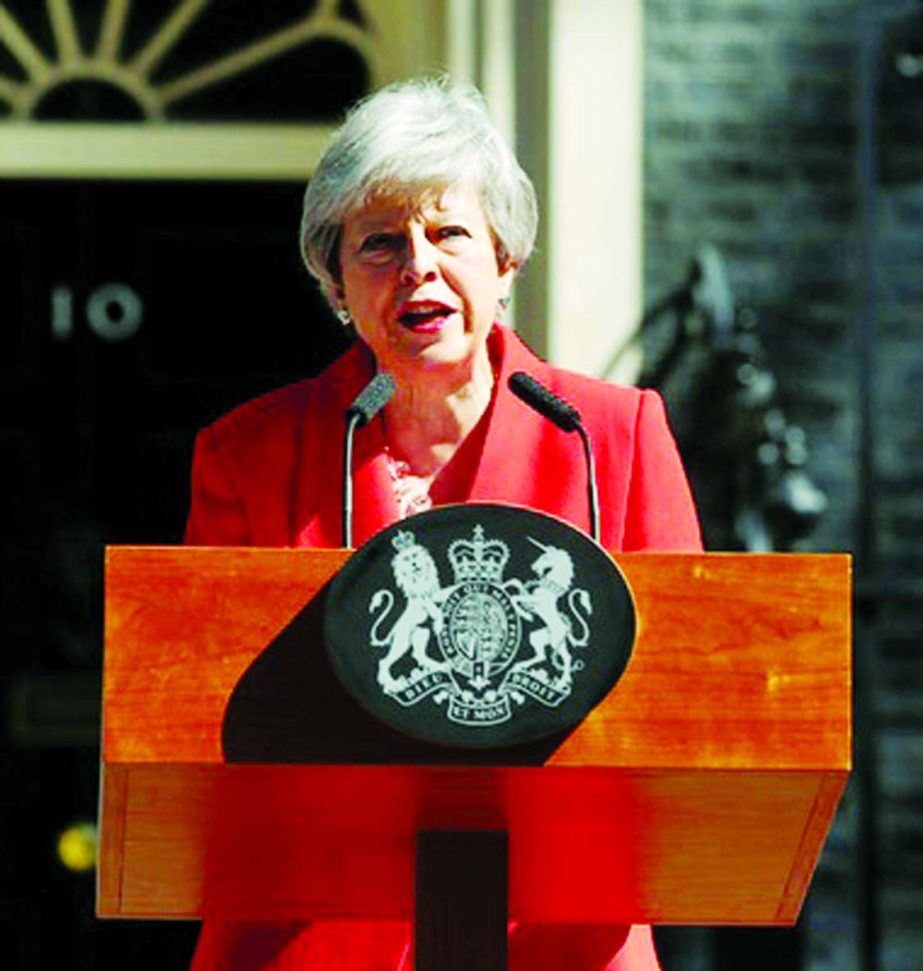
Reuters :
Fighting back tears, Theresa May said on Friday she would quit, setting up a contest that will bring a new British prime minister to power who could pursue a cleaner break with the European Union.
May’s departure will deepen the Brexit crisis as a new leader is likely to want a more decisive split, raising the chances of a confrontation with the EU and a potentially unpredictable snap parliamentary election.
Her voice cracking with emotion, May, who endured crises and humiliation in her failed effort to find a compromise Brexit deal that parliament could ratify, said she would resign as Conservative Party leader on June 7 with a leadership contest beginning the following week.
“I will shortly leave the job that has been the honour of my life to hold,” May said outside her Downing Street official residence. “The second female prime minister, but certainly not the last.
“I do so with no ill will but with enormous and enduring gratitude to have had the opportunity to serve the country I love,” May said, with her husband, Philip, looking on.
May, once a reluctant supporter of EU membership, who won the top job in the turmoil that followed the 2016 Brexit referendum, steps down with her central pledge – to lead the United Kingdom out of the bloc and heal its divisions – unfulfilled.
“It is, and will always remain, a matter of deep regret to me that I have not been able to deliver Brexit,” May said, adding that her successor would have to find a consensus to honour the 2016 referendum result.
Jeremy Corbyn, leader of the main opposition Labour Party, said the new prime minister must hold a parliamentary election to “let the people decide our country’s future”.
May bequeaths a deeply divided country and a political elite that is deadlocked over how, when or whether to leave the EU.
Most of the leading contenders to succeed May all want a tougher divorce deal, although the EU has said it will not renegotiate the Withdrawal Agreement it sealed with Britain in November.
Fighting back tears, Theresa May said on Friday she would quit, setting up a contest that will bring a new British prime minister to power who could pursue a cleaner break with the European Union.
May’s departure will deepen the Brexit crisis as a new leader is likely to want a more decisive split, raising the chances of a confrontation with the EU and a potentially unpredictable snap parliamentary election.
Her voice cracking with emotion, May, who endured crises and humiliation in her failed effort to find a compromise Brexit deal that parliament could ratify, said she would resign as Conservative Party leader on June 7 with a leadership contest beginning the following week.
“I will shortly leave the job that has been the honour of my life to hold,” May said outside her Downing Street official residence. “The second female prime minister, but certainly not the last.
“I do so with no ill will but with enormous and enduring gratitude to have had the opportunity to serve the country I love,” May said, with her husband, Philip, looking on.
May, once a reluctant supporter of EU membership, who won the top job in the turmoil that followed the 2016 Brexit referendum, steps down with her central pledge – to lead the United Kingdom out of the bloc and heal its divisions – unfulfilled.
“It is, and will always remain, a matter of deep regret to me that I have not been able to deliver Brexit,” May said, adding that her successor would have to find a consensus to honour the 2016 referendum result.
Jeremy Corbyn, leader of the main opposition Labour Party, said the new prime minister must hold a parliamentary election to “let the people decide our country’s future”.
May bequeaths a deeply divided country and a political elite that is deadlocked over how, when or whether to leave the EU.
Most of the leading contenders to succeed May all want a tougher divorce deal, although the EU has said it will not renegotiate the Withdrawal Agreement it sealed with Britain in November.

